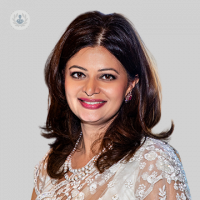Exploring the role of imaging and understanding progesterone resistance in endometriosis
Written by:Endometriosis affects millions of women worldwide, causing debilitating pain and impacting daily life in profound ways. Despite its prevalence, there remains a lack of understanding and awareness surrounding this condition. By raising awareness, we can empower individuals to seek proper diagnosis, treatment, and support, ultimately improving the quality of life for those living with endometriosis. Together, we can break the silence, educate others, and advocate for better care and research to ensure that no one suffers in silence.
Distinguished senior fertility specialist Dr Anu Chawla explores endometriosis, explaining the role of imaging in the diagnosis and treatment, alongside the role of progesterone resistance in the condition.

What are the latest updates in endometriosis treatments?
At the recent Edinburgh conference on endometriosis research, several notable updates emerged. Researchers presented promising findings regarding novel treatment approaches, including targeted therapies aimed at reducing inflammation and pain associated with endometriosis.
Additionally, the presentation emphasised progress in diagnostic tools and techniques, offering hope for earlier and more accurate detection of the condition, and conversations underscored the importance of interdisciplinary collaboration and patient-centred care in driving progress forward.
Overall, the conference provided a platform for exchanging ideas and fostering collaborations to improve outcomes for individuals affected by endometriosis.
What is the role of imaging in endometriosis?
Imaging plays a crucial role in the diagnosis and management of endometriosis. Techniques such as transvaginal ultrasound (TVUS), magnetic resonance imaging (MRI), and occasionally computed tomography (CT) scans can help visualise endometrial lesions and assess their size, location, and extent.
These imaging modalities aid in surgical planning, allowing for more precise and targeted treatment. Additionally, advances in imaging technology, such as high-resolution MRI and three-dimensional (3D) imaging, are enhancing our ability to detect subtle lesions and improve diagnostic accuracy. Incorporating imaging into the diagnostic process enables clinicians to better understand the extent of disease and tailor treatment strategies to individual patients, ultimately improving outcomes and quality of life.
What is the link between progesterone resistance and endometriosis?
Progesterone resistance is a key factor in the development of endometriosis. Normally, progesterone works to regulate the menstrual cycle and inhibit the growth of endometrial tissue outside the uterus. However, in individuals with endometriosis, there is evidence of decreased progesterone responsiveness in ectopic endometrial tissue. This resistance leads to uncontrolled growth, inflammation, and continued survival of endometrial implants, contributing to the persistence and progression of the disease.
Several mechanisms underlie progesterone resistance in endometriosis, including alterations in progesterone receptor expression, dysregulation of signalling pathways, and crosstalk with inflammatory mediators. Progesterone resistance not only promotes the survival of ectopic endometrial tissue, but also contributes to symptoms such as pain, infertility, and menstrual irregularities. Understanding the mechanisms of progesterone resistance is crucial for developing targeted therapeutic approaches aimed at restoring progesterone sensitivity and mitigating the progression of endometriosis.
Therapies targeting progesterone resistance offer hope for improving symptom management and fertility outcomes in individuals with endometriosis.
How can a doctor help with endometriosis management?
Seeing a doctor is crucial for alleviating symptoms, and managing endometriosis effectively. A healthcare provider can provide an accurate diagnosis, offer treatment options tailored to individual needs, and help monitor the progression of the condition. Early intervention can prevent the worsening of symptoms and potential complications such as infertility or organ damage. Furthermore, a doctor can offer guidance on pain management strategies, hormone therapy, and surgical options if necessary.
They can also provide emotional support and connect patients with resources such as support groups or mental health services. Regular check-ups with a doctor allow for ongoing evaluation of treatment effectiveness and adjustments as needed. Overall, seeking medical care empowers individuals with endometriosis to take control of their health and improve their quality of life.
If you are concerned about endometriosis and would like to book a consultation with Dr Chawla, do not hesitate to do so by visiting her Top Doctors profile today


